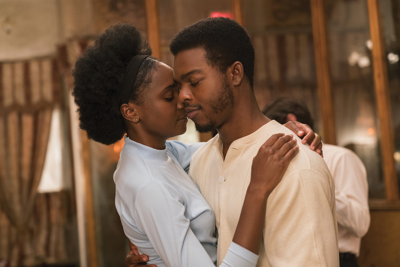
If Beale Street Could Talk
This time of year, it’s easy to get caught up in the hubbub of Oscar-nomination predictions and lose sight of the personal relationships we form with movies and their makers. Oscar season raises what I think is the central question of what makes a film spectacular: Will we remember how it made us feel years down the road? Plenty of past Academy Award winners fail there. But If Beale Street Could Talk — the third film by the celebrated Moonlight director Barry Jenkins — will endure.
Beale Street captures the breathless, soaring elation of first love as well as the bitter emotion of trying desperately to protect what’s yours. It will open your eyes to injustice so you’re hot with rage, and it will make you dizzy with longing for the someone or something that makes you feel like you are home, safe, loved. The film shines a light on systemic racism and the tremendous need for criminal justice reform — as much today as in the 1970s, when Beale Street is set. But it’s also a testament to the restorative power of love in black American families.
Based on the 1974 James Baldwin novel of the same name, Beale Street stars newcomer KiKi Layne as Tish Rivers, a 19-year-old from Harlem who is three months pregnant. The baby’s father — Tish’s fiancé and childhood best friend, Fonny Hunt (Stephan James) — is in prison. He’s been accused of rape, but Tish knows better than anyone that Fonny is innocent — the two were together when the assault happened, and a vengeful cop fingered Fonny for the crime. As in the novel, the narrative oscillates between the story of Tish and Fonny falling in love and the story of Fonny’s imprisonment as the couple’s families do everything they can to secure his release.
For his performance, James drew from the real-life tragedy of Kalief Browder, a young man who killed himself in 2015 after being imprisoned for three years. Browder spent most of that time in solitary confinement without ever being charged. With one minor exception, we see Fonny in prison only as Tish does, through the thick glass partition in the visitation room. Director of photography James Laxton shot these scenes with the actors head-on separately, capturing the range of emotions that crosses their faces. As Fonny falls apart, Tish tries to reassure him. These characters are charged with bearing heavier burdens than they should at such a young age, and Layne and James don’t overact. They’re quiet but expressive.
One of Beale Street’s most gut-wrenching elements is seeing Tish’s parents — Sharon and Joseph, portrayed by Regina King and Colman Domingo — try desperately to protect their children, fighting forces more powerful than even their love. King commands both strength and vulnerability in her performance, showing them to be two sides of the same coin. Domingo, meanwhile, plays a blue-collar father fighting for his own humanity and the right to protect his family as a patriarch and a man. It’s a heavy load to bear, and Domingo portrays it with grace and humor. In one of the most moving scenes in the film, Joseph gives Fonny’s disheartened father a pep talk as they hatch a plan to secure the money for legal expenses. “These are our children,” Joseph says, “and we’ve got to set them free.”
As in Moonlight, the film’s technical details lend emotional weight. Colorist Alex Bickle amplifies contrast and saturates warm tones to make the brown skin of the actors richer. Scenes in Sharon and Joseph’s apartment — filmed in a Harlem brownstone rather than on a soundstage — are full of warm orange and brown tones. Tish is dressed in golds and yellows that capture the way she glows for Fonny, especially in the prison visitation room. All this is paired with Nicholas Brittel’s soaring score that the film wears like its own skin — it’s impossible to imagine one without the other. It plays like a tribute to Baldwin’s great “Sonny’s Blues,” a short story about how art, specifically jazz, can can help us maintain our integrity and vitality even in the face of injustice and cruelty.
I wouldn’t trust many filmmakers to adapt Baldwin’s work. Raoul Peck proved his mettle with 2016’s I Am Not Your Negro, a documentary about American racism that’s partially narrated by recordings of Baldwin’s voice. But the author’s fiction is something else altogether. It depicts families and couples in relationships that are complicated by oppression and tells their stories using the cadence of a preacher’s sermon and the spontaneity of jazz.
But If Beale Street Could Talk is something else altogether — a slim, unassuming volume that tells the story of a young black woman in her own voice. Baldwin, so present in the rest of his work that he seems to inhabit not only the characters but the streets and front stoops of their lives, disappears into Tish’s voice. Jenkins’ challenge was not only to translate Baldwin’s work — a Herculean task unto itself — but to himself disappear. He succeeds, birthing something that just might outlive us all.





